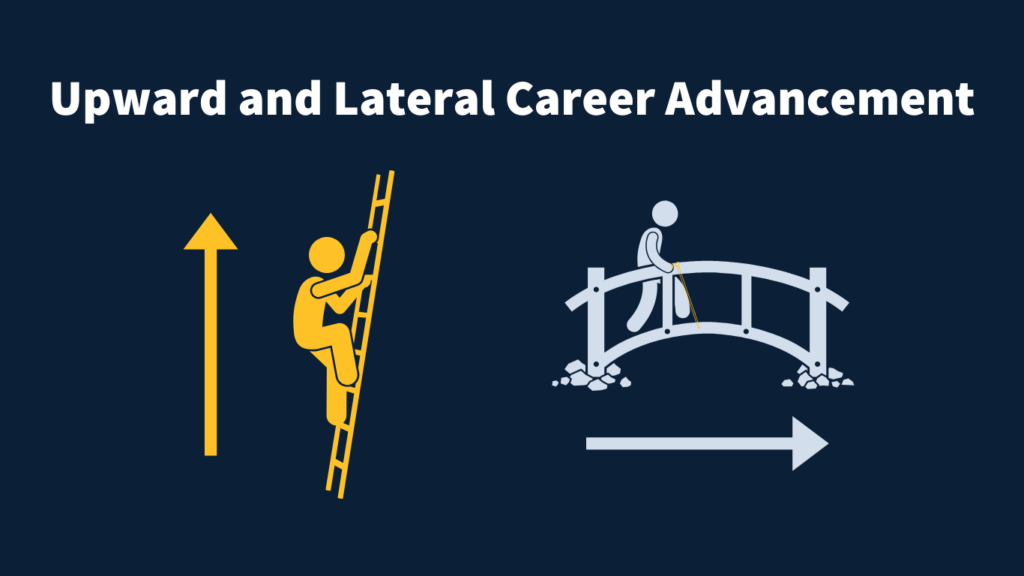January 21, 2025
Unlocking Career Advancement

People with disabilities face challenges in advancing their careers and are under-represented in professional, scientific, and technical fields, as well as in management and executive roles. [1],[2]. Career advancement is closely tied to the meaningfulness of work and brings significant benefits to both individuals with disabilities and their employers, including enhanced life satisfaction, job fulfillment, increased compensation, greater autonomy and flexibility, well-being, inclusion and belonging, and loyalty. [3],[4],[5].
Let's explore the various forms of career advancement, the barriers that individuals with disabilities face, and the facilitators that can help overcome these challenges. By doing so, we can explore how to create pathways for persons with disabilities to thrive in their careers.
What is Career Advancement?
When people think of career advancement, they often envision it as a staircase or ladder, where one progresses upwards from an entry-level position to a higher-ranking, senior, or leadership role in traditional employment hierarchies. Sometimes, this is referred to as “climbing the corporate ladder” where each rung represents an increase in rank. For example, a dishwasher might be promoted to prep cook or a head chef might advance to executive chef in a restaurant.
However, career advancement could also involve building bridges across positions, organizations, and fields, including in non-traditional forms of employment like gig work, entrepreneurship, and freelancing. Some examples of career bridges include learning new skills, taking on different responsibilities, working additional hours, transitioning to jobs in new organizations or fields, and starting new businesses. For instance, a dishwasher working 10 hours a week who feels capable of handling more might be approved to work an additional 5 hours with some new, minor prep duties weekly … or they may choose to reskill in marketing and digital skills, eventually launching an online store.
What are common barriers to career advancement for persons with disabilities?
Many barriers can prevent persons with disabilities from advancing in their careers. Even though persons with disabilities are more likely to be overqualified for roles, employers may underestimate their abilities and only consider them for low-paying, less meaningful work.[6] Tokenism is also a concern when employers hire persons with disabilities in order to appear inclusive while failing to address accessibility and inclusion barriers and being reluctant to give persons with disabilities decision-making power.[7]Persons with disabilities are also often overlooked when it comes to professional development and advancement opportunities.[8] Ultimately, stigma continues to be a major barrier to career advancement for persons with disabilities.[9]
Persons with disabilities who are currently employed may feel ‘locked’ into their position. They may be reluctant to pursue opportunities that would advance their career because they fear losing health and other benefits provided by their employer.[10] They may also risk losing governmental disability benefits if they work more hours or increase their income above the allowable threshold.[8]
The type of work persons with disabilities are doing may also be a barrier to career advancement. Persons with disabilities are more likely to work in non-traditional, precarious jobs.[11] In this type of employment, harassment and burnout are common, workers receive few benefits (e.g., health benefits, time off), the input of workers is undervalued, and there are few protections for workers. [11],[12] These types of jobs often lack opportunities for advancement.
What can we do to support career advancement for workers with disabilities?
Thankfully, there’s a lot we can do to improve outcomes for jobseekers and workers with disabilities across Canada.
Disability rights legislation and policy support career advancement by prohibiting discrimination and mandating inclusion and accessibility. We must continue to advocate for stronger laws and policies to support career growth.
Workplaces need more disability-confident leaders who can foster accessible environments and inclusive cultures.[13] These leaders should recognize the skills and ambitions of their workers, assign high-visibility, challenging tasks, and provide the necessary support for employee success.[14] Transparent and authentic communication from workplace leadership about accessibility and inclusion can reduce stigma in the workplace,[15] while mentoring and support networks can facilitate professional development for employees with disabilities.[16],[17]
Disability inclusion training can help to debunk misconceptions, highlight common workplace barriers, educate staff about diverse disability experiences, and improve disability confidence.[15],[18] This training benefits everyone: leaders and colleagues become more knowledgeable, and workers with disabilities spend less time self-advocating and gain tools for confronting discrimination and building confidence. [15],[13]
Workplaces can streamline the accommodations process to ensure workers have the support and tools they need to thrive. Employers should identify and remove barriers to disclosure, de-medicalize the accommodations process, ensure access to accommodations throughout the employment lifecycle, and conduct occupational assessments to provide support for all employees. [14],[19].
Workers with disabilities can also take charge of their career development through career management. This involves planning and decision-making based on their talents, interests, values, and lifestyle preferences to determine suitable jobs, companies, and industries.[20] Workers who want to advance in their careers can focus on skill-building, networking, mentorship, setting clear career goals, maintaining a positive mindset despite obstacles, and engaging in disability advocacy in the workplace. [21]
Further Resources
Are you a manager; Diversity, Inclusion, Equity, and Accessibility specialist; HR professional; or employer who wants to become disability confident? CCRW’s Disability Confidence Toolkit provides a dedicated section on career advancement for inclusive employers. This tool can help workplace leaders learn how to have career conversations with, determine advancement opportunities for, and empower the career development of workers with disabilities.
Are you a disability-confident employer or HR professional looking to hire inclusively? Or are you a jobseeker with a disability seeking disability-confident employers and organizations? Untapped Talent is an online job board powered by CCRW that connects job seekers with disabilities to meaningful employment opportunities from disability-confident employers across Canada. Our Disability Confident Toolkit also dives into recruitment and onboarding.
To learn more about current trends in employment for persons with disabilities, including an in-depth look at Career Advancement, check out our 2024 Trends Report, Shaping Tomorrow. Shaping Tomorrow is a comprehensive resource on how creating accessible, disability-inclusive workplaces improves employee satisfaction and wellness, creates strategic business advantages, and demonstrates employers’ commitments to ethical and social responsibility.
[1] Statistics Canada. (2023, August 30). Labour market characteristics of persons with and without disabilities in 2022: Results from the Labour Force Survey. https://www150.statcan.gc.ca/n1/daily-quotidien/230830/dq230830a-eng.htm
[2] Statistics Canada (2023, April 4). Representation of persons with disabilities in executive positions, 2016 to 2019. https://www150.statcan.gc.ca/n1/dailyquotidien/230404/dq230404b-eng.htm
[3] Soren, A., & Ryff, C. D. (2023). Meaningful work, well-being, and health: Enacting a eudaimonic vision. International Journal of Environmental Research and Public Health, 20(6570). https://doi.org/10.3390%2Fijerph20166570
[4] Fairlie, P. (2011). Meaningful work, employee engagement, and other key employee outcomes: Implications for human resource development. Advances in Developing Human Resources, 13(4), 508-525. https://doi.org/10.1177/1523422311431679
[5] Arnoux-Nicolas, C., Sovet, L., Lhotellier, L., di Fabio, A., & Bernaud, J-L. (2016). Perceived Work conditions and turnover intentions: The mediating role of meaning of work. Frontiers in Psychology, 7(704). https://doi.org/10.3389/fpsyg.2016.00704
[6] Jones, M. K., & Sloane, P. J. (2010). Disability and skill mismatch. Economic Record, 86, 101-114. https://doi.org/10.1111/j.1475-4932.2010.00659.x
[7] Boyd, A. (2023). The effects of tokenism on workplace diversity and inclusion efforts. Amber K. Boyd Attorney at Law. https://www.amberboydlaw.com/the-effects-of-tokenism-on-workplace-diversity-and-inclusion-efforts
[8] Al-Azary, N., Sinclair, V., Bath, R., & Pagliaro, M. (2024). Career advancement pathways for workers with disabilities (Trends Report 2024: Shaping Tomorrow). Canadian Council on Rehabilitation and Work. https://ccrw.org/wp-content/uploads/2024/10/Career-advancement-pathways-for-workers-with-disabilities_CCRW_Trends-Report-2024.pdf
[9] Centers for Disease Control and Prevention (n.d.). Common barriers to participation experienced by people with disabilities. https://www.cdc.gov/ncbddd/disabilityandhealth/disability-barriers.html
[10] Fisher, G. G., Ryan, L. H., Sonnega, A., & Naudé, M. N. (2016). Job Lock, work, and psychological well-being in the United States. Work, Aging and Retirement, 2(3), 345. https://doi.org/10.1093/workar/waw004
[11] Shahidi, F. V., Jetha, A., Kristman, V., Smith, P. M., & Gignac, M. A. (2023). The employment quality of persons with disabilities: Findings from a national survey. Journal of Occupational Rehabilitation, 33(4), 785-795. https://doi.org/10.1007/s10926-023-10113-7
[12] Chen, W. H., & Mehdi, T. (2019). Assessing job quality in Canada: A multidimensional approach. Statistics Canada. https://www150.statcan.gc.ca/n1/pub/11f0019m/11f0019m2018412-eng.htm
[13] Suter, R., Scott-Parker, S. and Zadek, S. (2007). Realising potential: Disability confidence builds better business. Cornell
University. https://ecommons.cornell.edu/server/api/core/bitstreams/4a1cab2e-bfac-4ece-aa6b-61f9e4c6570f/content
[14] de Raaf, S., Wray, P., & Thackeray, L. (2023, September). Career mobility of people with disabilities. Social Research and Demonstration Corporation. https://www.srdc.org/wp-content/uploads/2024/03/Career-Mobility-and-People-with-Disabilities-Project-Final-Report.pdf
[15] Jones, G.E. (1997). Advancement opportunity issues for persons with disabilities. Human Resource Management Review 7(1), 55-76. https://doi.org/10.1016/S1053-4822(97)90005-X
[16] Mentor Canada. (2022, August). The mentoring effect: Youth experiencing disabilities. https://mentorcanada.ca/sites/default/files/2022-08/The%20Mentoring%20Effect%20Youth%20Experiencing%20Disabilities%20EN_new.pdf
[17] Robert, P. M., & Harlan, S. L. (2006). Mechanisms of disability discrimination in large bureaucratic organizations: Ascriptive inequalities in the workplace. The Sociological Quarterly, 47(4), 599-630. https://doi.org/10.1111/j.1533-8525.2006.00060.x
[18] Samosh, D. (2020). The three-legged stool: Synthesizing and extending our understanding of the career advancement facilitators of persons with disabilities in leadership positions. Business & Society, 60(7), 1773-1810. https://doi.org/10.1177/000765032090713
[19] Tomas, V., Ahmed, H., & Lindsay, S. (2022). Unravelling the complexities of workplace disclosure among persons with non-visible disabilities and illnesses: A qualitative meta-ethnography. Journal of Occupational Rehabilitation, 32, 538-563. https://doi.org/10.1007/s10926-022-10023-0
[20] King, Z. (2004). Career self-management: Its nature, causes and consequences. Journal of Vocational Behavior, 65(1), 112-133. https://doi.org/10.1016/S0001-8791(03)00052-6
[21] Coetzee, M., Ximba, T., & Potgieter, I. L. (2017). Exploring career advancement challenges people with disabilities are facing in the South African work context. SA Journal of Human Resource Management, 15(1), 1-11. https://doi.org/10.4102/sajhrm.v15i0.815
Subscribe
Sign up to receive updates from CCRW.
